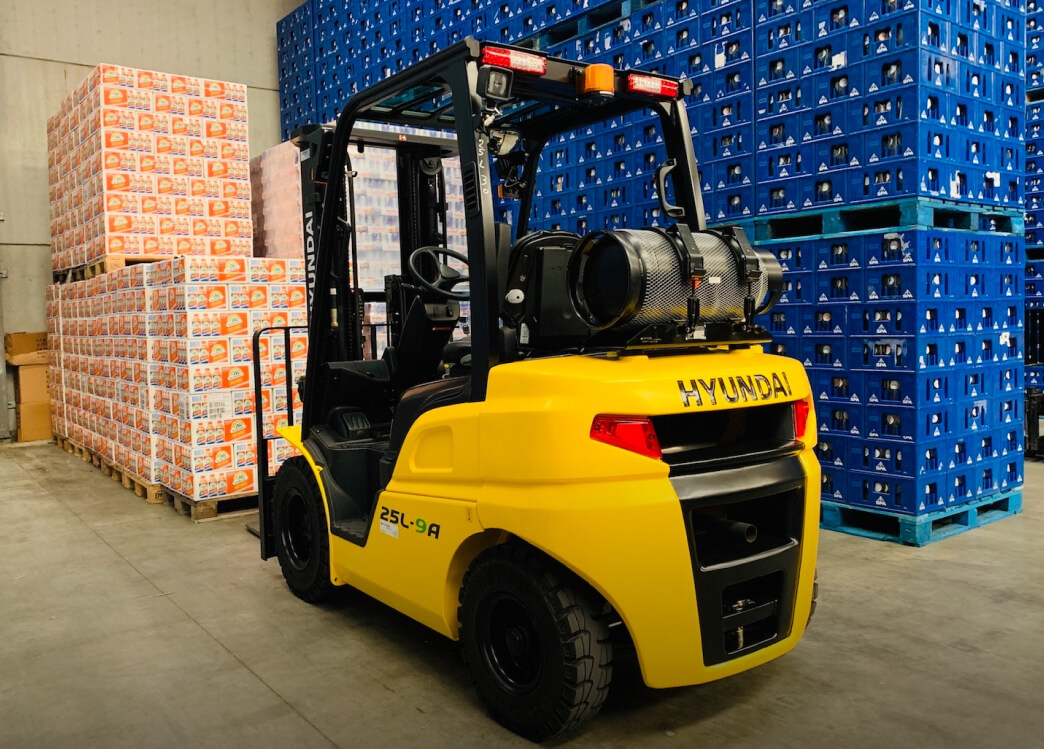Zalety i wady wózków widłowych zasilanych LPG

Czy zastanawiałeś się kiedyś, jakie są zalety i wady wózków widłowych zasilanych LPG w porównaniu do ich odpowiedników? Obecnie efektywność i ekologia odgrywają istotną rolę w branży logistycznej i magazynowej, a wybór odpowiedniego wózka widłowego może znacząco wpłynąć na wydajność i ekonomikę przedsiębiorstwa. W tym artykule przyjrzymy się bliżej wózkom widłowym zasilanym LPG, przedstawiając główne ich zalety i wady.
Zalety wózków widłowych zasilanych LPG
Wózki widłowe zasilane LPG, czyli gazem płynnym, stanowią interesującą opcję dla przedsiębiorstw poszukujących nie tylko efektywnych, ale i elastycznych rozwiązań w zakresie logistyki i zarządzania magazynem. Ich zalety sprawiają, że są one atrakcyjną alternatywą dla wózków elektrycznych oraz tych napędzanych dieslem. Przyjrzyjmy się im dokładniej:
1. Wszechstronność zastosowania
Jedną z największych zalet wózków widłowych LPG jest ich wszechstronność. Mogą one być efektywnie używane zarówno wewnątrz hal produkcyjnych i magazynowych, jak i na zewnątrz, w różnorodnych warunkach pogodowych. Ich wydajność nie jest ograniczana przez temperaturę, co czyni je idealnym rozwiązaniem dla przedsiębiorstw działających w różnorodnych środowiskach.
2. Natychmiastowa gotowość do pracy
W przeciwieństwie do wózków elektrycznych, które wymagają czasu na ładowanie baterii, wózki LPG są gotowe do pracy zaraz po uzupełnieniu zbiornika gazowego. To skraca czas przestojów i zwiększa efektywność operacyjną, zwłaszcza w intensywnie działających magazynach.
3. Moc i wydajność
Wózki widłowe zasilane LPG oferują znakomitą moc i moment obrotowy, co przekłada się na wysoką wydajność przy pracy z ciężkimi ładunkami i na długich dystansach. Są one zdolne do obsługi ciężarów, z którymi wózki elektryczne mogłyby mieć trudności, co sprawia, że są idealnym wyborem dla zadań wymagających większej siły.
4. Ekologiczniejszy wybór
Chociaż LPG jest paliwem kopalnym, to jednak wypada znacznie korzystniej pod względem emisji szkodliwych substancji niż olej napędowy. Spalanie LPG generuje mniej dwutlenku węgla, tlenków azotu oraz cząstek stałych, co przyczynia się do redukcji wpływu operacji magazynowych na środowisko.
5. Koszty eksploatacji
Pomimo że koszt paliwa może być zmienny, w długim terminie wózki widłowe zasilane LPG często okazują się bardziej ekonomiczne niż ich odpowiedniki na olej napędowy ze względu na niższe koszty utrzymania. Systemy LPG są zazwyczaj mniej skomplikowane i mniej podatne na awarie niż systemy diesla, co przekłada się na niższe koszty serwisowania.
6. Dostępność paliwa
LPG jest paliwem szeroko dostępnym na rynku, co ułatwia logistykę i zapewnia ciągłość pracy wózków. Możliwość szybkiego uzupełnienia paliwa bez potrzeby długotrwałego ładowania akumulatorów jest kluczowa w zapewnieniu płynności operacji magazynowych.
Wady wózków widłowych zasilanych LPG
Chociaż wózki widłowe zasilane gazem LPG posiadają wiele zalet, istnieją również aspekty, które mogą być postrzegane jako ograniczenia lub wady. Rozważając zakup lub wynajem takich wózków dla swojej działalności, ważne jest, aby być świadomym potencjalnych wyzwań, które mogą się pojawić. Oto niektóre z głównych wad wózków widłowych LPG:
1. Koszty paliwa
Choć wybór LPG jest często tańszy od diesel, koszty paliwa mogą być wyższe w porównaniu do energii elektrycznej, zwłaszcza w regionach z niskimi cenami prądu. Wahania cen gazu mogą również wprowadzać niepewność co do przewidywanych kosztów eksploatacji.
2. Przechowywanie i logistyka paliwa
Wymóg magazynowania butli z gazem LPG wiąże się z koniecznością przestrzegania szeregu przepisów bezpieczeństwa. Magazyn paliwa musi być odpowiednio zaprojektowany i zlokalizowany, co może generować dodatkowe koszty inwestycyjne. Ponadto, zarządzanie zapasami paliwa wymaga dobrej organizacji i planowania.
3. Wymagania dotyczące konserwacji
Systemy zasilania LPG mogą wymagać bardziej skomplikowanej konserwacji niż elektryczne układy napędowe, ze względu na większą liczbę ruchomych części i elementów podlegających zużyciu. Regularne przeglądy i konserwacja są niezbędne, aby zapewnić niezawodność i bezpieczeństwo pracy wózków.
4. Wpływ na środowisko
Chociaż LPG jest uznawane za paliwo stosunkowo ekologiczne, nadal jest to produkt pochodzenia kopalnego, który przyczynia się do emisji gazów cieplarnianych. Firmy dążące do minimalizacji swojego śladu węglowego mogą więc preferować wózki elektryczne jako bardziej zrównoważoną opcję.
5. Ograniczenia w pracy w bardzo niskich temperaturach
Mimo że wózki LPG są wydajne w chłodnych środowiskach, w ekstremalnie niskich temperaturach ich wydajność może być nieco ograniczona. To może być ważne dla przedsiębiorstw działających w bardzo zimnych klimatach lub w zamrażalniach.
Podsumowanie
Wybór między wózkami widłowymi zasilanymi LPG a innymi typami wózków zależy od wielu czynników, takich jak specyfika pracy, warunki pracy, dostępność paliw i kwestie ekologiczne. Wózki LPG oferują wyjątkową kombinację mocy, wydajności i wszechstronności, ale ważne jest, aby rozważyć również ich potencjalne wady.

